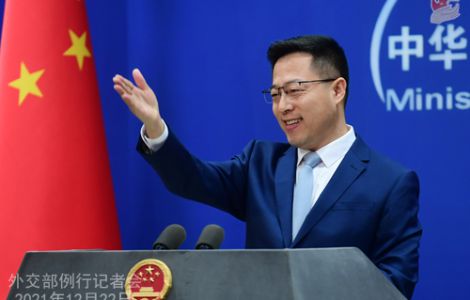中英对照:2021年12月22日外交部发言人赵立坚主持例行记者会 [4]
Foreign Ministry Spokesperson Zhao Lijian’s Regular Press Conference on December 22, 2021 [4]
8个月来,日方不断为核污染水排海决策辩解,声称这是安全的。但很多国家和国际环保组织都提出疑问,如果核污染水真的安全无害,为什么日方不向国内湖泊排放核污染水或是在国内循环利用?再退一步讲,为什么日方不选择建设更多的储蓄罐在国内储存?对于排放的核污染水是否安全,国际社会能够听信日方的一家之言吗?对于这类根本性的问题,日方理应作出负责任的回答。
Over the past eight months, Japan has constantly tried to defend the decision to discharge the nuclear-contaminated water into the sea, claiming the discharge is safe. However, many countries and international environment groups have questioned that. If the water is truly harmless, why doesn’t the Japanese side discharge it into lakes or reuse it domestically instead of releasing it into the ocean? To say the least, why doesn’t it try to build more storage tanks for the water at home? How can the international community trust Japan’s own words regarding whether the water to be discharged is safe or not? The Japanese side should give responsible answers to all these fundamental questions.
我要再次强调的是,日本福岛核污染水处置关乎全球海洋生态环境和公众健康,绝不是日方一家私事。日方应认真倾听和回应包括周边邻国在内的国际社会关切,撤销向海洋排放核污染水的错误决定。除非同利益攸关方和有关国际机构充分协商并达成一致,否则日方不得启动核污染水排海。
I want to stress once again that the handling of the nuclear-contaminated water from Fukushima is never Japan’s private matter. Instead, it bears on the marine environment and public health of the whole world. Japan should heed and respond to the appeals of neighboring countries and the international community, and rescind the wrong decision of dumping the water into the sea. It mustn’t wantonly start the ocean discharge before reaching consensus with stakeholders and relevant international institutions through full consultation.
注:为确保中英对照准确,“热词译”网站可能对中英文重新分段。

